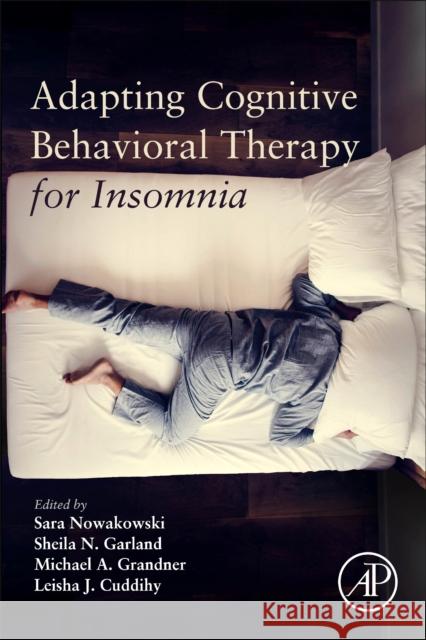Adapting Cognitive Behavioral Therapy for Insomnia » książka



Adapting Cognitive Behavioral Therapy for Insomnia
ISBN-13: 9780128228722 / Angielski / Miękka / 2021 / 490 str.
Adapting Cognitive Behavioral Therapy for Insomnia
ISBN-13: 9780128228722 / Angielski / Miękka / 2021 / 490 str.
(netto: 547,05 VAT: 5%)
Najniższa cena z 30 dni: 570,87
ok. 16-18 dni roboczych.
Darmowa dostawa!
Preface Acknowledgments
Part 1: Traditional CBT-I components and delivery
1. Standard cognitive behavioral therapy for insomnia (CBT-I) Alexandria Muench, Ivan Vargas, Donn Posner, and Michael L. Perlis
Part 2: CBT-I in other sleep disorders
2. CBT-I in patients with obstructive sleep apnea Earl Charles Crew
3. CBT-I for patients with phase disorders or insomnia with circadian misalignment Marissa A. Evans and Brant P. Hasler
4. CBT-I for patients with shift work disorder Philip Cheng
5. CBT-I for patients with hypersomnia disorders Jason C. Ong and Matthew D. Schuiling
6. CBT-I for patients with orthosomnia Kelly Glazer Baron
Part 3: CBT-I in psychiatric disorders
7. CBT-I for patients with depression Jennifer Goldschmied and Philip Gehrman
8. CBT-I for patients with schizophrenia and other psychotic disorders Andrew Scott Tubbs and Michael A. Grandner
9. CBT-I for people diagnosed with bipolar disorder: Moving from a disorder-focused to a transdiagnostic conceptualization Allison G. Harvey and Caitlin E. Gasperetti
10. CBT-I in patients with alcohol use and cannabis use disorders Gabrielle E. Bowyer, Trevor M. Brooks, and Deirdre A. Conroy
Part 4: CBT-I in medical disorders
11. CBT-I for patients with chronic pain Leisha J. Cuddihy, Sara Nowakowski, Michael A. Grandner, Jessica M. Meers, and Michael T. Smith
12. CBT-I during and after a cancer diagnosis Sheila N. Garland
13. CBT-I in patients with a history of traumatic brain injury Erin A. Almklov, Guadalupe L. Rivera, and Henry Orff
Part 5: CBT-I across the lifespan
14. CBT-I for adolescents Melisa E. Moore and Alison R. Hartman
15. CBT-I in pregnancy Anna L. MacKinnon, Ivan D. Sedov, and Lianne M. Tomfohr-Madsen
16. CBT-I for perimenopause and postmenopause Jessica M. Meers, Darius B. Dawson, and Sara Nowakowski
17. CBT-I for older adults Jaime M. Hughes and Jennifer L. Martin
Part 6: Other special considerations
18. CBT-I in the short sleep duration phenotype Julio Fernandez-Mendoza
19. CBT-I for people who failed CBT-I Michael A. Grandner, Denise Rodriguez Esquivel, and Spencer Dawson
20. CBT-I in patients who wish to reduce use of hypnotic medication Norah Simpson and Rachel Manber
Sara Nowakowski Baylor College of Medicine Medicine-Health Services Research 2450 Holcombe Blvd., Suite 01Y Houston, TX 77586 United States. Dr. Nowakowski is a licensed clinical psychologist and board certified in sleep medicine. Her research in sleep includes projects on sleep and menopause; psychological well-being pre-post hysterectomy, sleep pre-post acute hospital stay in aging patients, and a bedrest study of aging participants. Her research and clinical expertise focuses on assessment and treatment of sleep disorders. Sheila N. Garland, PhD is a Registered Clinical Psychologist, Associate Professor in Psychology and Oncology at Memorial University in Newfoundland and Labrador, Canada, and Senior Scientist with the Beatrice Hunter Cancer Research Institute in Halifax Nova Scotia. She received her PhD in Clinical Psychology from the University of Calgary, Alberta, and completed a 3-year post-doctoral fellowship in Behavioral Sleep Medicine at the University of Pennsylvania. As Director of the Sleep, Health, and Wellness Lab, she delivers, evaluates, and provides training on behavioural sleep medicine interventions in chronic disease populations and in those with co-morbid psychiatric disorders. Her research explores the mechanisms and effectiveness of interventions to improve sleep and other symptoms in cancer survivors. Dr. Michael Grandner is a licensed clinical psychologist, Director of the Sleep and Heath Research Program at the University of Arizona, and Director of the Behavioral Sleep Medicine Clinic at the Banner-University Medical Center in Tucson, AZ. His work focuses on translational sleep research and Behavioral Sleep Medicine, including studies of sleep as a domain of health behavior and the development and implementation of behavioral interventions for insufficient sleep and sleep disorders. Specific areas of focus include: (1) Downstream cardiovascular, metabolic, and behavioral health outcomes associated with habitual sleep duration and/or insufficient sleep, (2) Upstream social, behavioral, and biological determinants of habitual sleep duration, insufficient sleep, and poor sleep quality, and (3) Development and implementation of behavioral interventions for sleep as a domain of health behavior. Leisha Cuddihy, PhD, DBSM is a licensed Clinical Psychologist providing behavioral sleep medicine services at the Spectrum Health Sleep Disorders Center and Helen DeVos Children's Hospital Behavioral Health. She received her PhD in Clinical Psychology from the University of Arizona, and completed a 1-year post-doctoral fellowship in Behavioral Sleep Medicine at the University of Michigan. She is Certified in Behavioral Sleep Medicine by the American Board of Sleep Medicine and is a Diplomate in Behavioral Sleep Medicine by the Board of Behavioral Sleep Medicine. In her full-time clinical practice, she sees adult and pediatric patients struggling with insomnia, circadian rhythm disorders, positive airway pressure non-adherence, and disorders of excessive daytime sleepiness. In collaboration with her sleep medicine colleagues, she often assists patients with managing insomnia as they reduce or discontinue sleep aids. She specializes in CBT-I but is passionate about using a variety behavioral sleep medicine strategies to help patients resolve sleep problems.
1997-2026 DolnySlask.com Agencja Internetowa
KrainaKsiazek.PL - Księgarnia Internetowa









